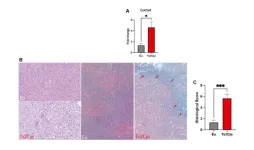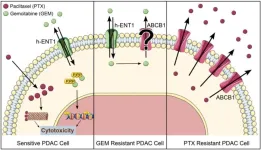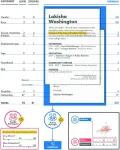(Press-News.org) MINNEAPOLIS – A new study looks at predicting how quickly people with early Alzheimer’s disease will experience cognitive decline. The study is published in the July 10, 2024, online issue of Neurology®, the medical journal of the American Academy of Neurology. It also looked at how the new drugs recently approved for the disease may reduce decline.
“The rate of cognitive decline varies greatly from person to person, and people are very interested in what to expect from the disease in themselves or their loved ones, so better prediction models are urgently needed,” said study author Pieter J. van der Veere, M.D., of Amsterdam University Medical Center, Netherlands.
The researchers developed models to predict how quickly people’s scores would decline on a test of thinking and memory skills. Then they compared the models to actual results from people over time. They studied 961 people with an average age of 65—310 had mild cognitive impairment and 651 had mild dementia. All had the amyloid-beta plaques in their brains that are an early sign of Alzheimer’s disease and are targeted by the new drugs.
For the cognitive test, scores range from zero to 30, with scores of 25 and higher indicating no dementia, scores of 21 to 24 indicating mild dementia, scores of 10 to 20 indicating moderate dementia and scores lower than 10 indicating severe dementia. The test scores of the people with mild cognitive impairment declined from 26.4 at the beginning of the study to 21.0 five years later. The scores of people with mild dementia declined from 22.4 to 7.8 five years later.
The models were helpful in predicting the rate of cognitive decline, but also show the uncertainty of these predictions, van der Veere noted. For half of the people with mild cognitive impairment, the actual test score differed by less than two points from the predicted score. For the people with mild dementia, the scores differed by less than three points for half of the people.
The researchers determined that a hypothetical person with mild cognitive impairment, a baseline test score of 28 and a certain level of amyloid plaques would be predicted to reach the stage of moderate dementia (test score of 20 points) after six years. When a treatment with drugs would reduce the rate of decline by 30%, this person would not reach the stage of moderate dementia until after 8.6 years. For a hypothetical person with mild dementia, a baseline score of 21 and a certain level of amyloid, the predicted time to reach a score of 15 points was 2.3 years, or 3.3 years when decline would be reduced by 30%.
Van der Veere said, “We understand that people with cognitive problems and their care partners are most interested in answers to questions like ‘How long can I drive a car?’ or ‘How long can I keep doing my hobby?’ In the future, we hope that models will help make predictions about these questions about quality of life and daily functioning. But until then, we hope these models will help physicians translate these predicted scores into answers for people’s questions.”
A limitation of the study was that the cognitive tests were not always given at the same time of day and people with cognitive decline may score lower later in the day when they are more tired.
The study was supported by Eisai, ZonMW and Health~Holland, Top Sector Life Sciences & Health.
Learn more about dementia at BrainandLife.org, home of the American Academy of Neurology’s free patient and caregiver magazine focused on the intersection of neurologic disease and brain health. Follow Brain & Life® on Facebook, X and Instagram.
When posting to social media channels about this research, we encourage you to use the hashtags #Neurology and #AANscience.
The American Academy of Neurology is the world's largest association of neurologists and neuroscience professionals, with over 40,000 members. The AAN’s mission is to enhance member career fulfillment and promote brain health for all. A neurologist is a doctor with specialized training in diagnosing, treating and managing disorders of the brain and nervous system such as Alzheimer's disease, stroke, concussion, epilepsy, Parkinson's disease, multiple sclerosis, headache and migraine.
For more information about the American Academy of Neurology, visit AAN.com or find us on Facebook, X, Instagram, LinkedIn and YouTube.
END
Can we predict how fast cognitive decline will occur with early Alzheimer’s?
2024-07-10
ELSE PRESS RELEASES FROM THIS DATE:
New Consumer Food insights from Purdue explores consumer attitudes toward U.S. farm bill
2024-07-10
The general public has limited knowledge of the U.S. farm bill that politicians are debating on Capitol Hill, according to the June 2024 Consumer Food Insights (CFI) Report.
The survey-based report out of Purdue University’s Center for Food Demand Analysis and Sustainability (CFDAS) assesses food spending, consumer satisfaction and values, support of agricultural and food policies, and trust in information sources. Purdue experts conducted and evaluated the survey, which included 1,200 consumers across the U.S
“Around one-third ...
Lion with nine lives breaks record with longest swim in predator-infested waters
2024-07-10
A record-breaking swim by two lion brothers across a predator-infested African river has been documented in a study co-led by Griffith University and Northern Arizona University.
Dr Alexander Braczkowski, from Griffith’s Centre for Planetary Health and Food Security, led a team that filmed a two-male lion coalition crossing the Kazinga Channel in Uganda at night, using high-definition heat detection cameras on drones. The work was done under the supervision of the Uganda Wildlife Authority.
One half of the lion brother duo was a 10-year-old ...
Pumpkin disease not evolving, could make a difference for management
2024-07-10
URBANA, Ill. -- The pathogen that causes bacterial spot is very good at what it does. Forming small lesions on the rinds of pumpkins, melons, cucumbers, and other cucurbits, it mars the fruits’ appearance and ushers in secondary pathogens that lead to rot and severe yield loss. The bacterium, Xanthomonas cucurbitae, is so successful that it has had no reason to evolve through time or space. That’s according to new University of Illinois Urbana-Champaign research characterizing ...
Aging exacerbates oxidative stress and liver fibrosis in an animal model of Down Syndrome
2024-07-10
“[...] our results put the basis for the use of antioxidants supplementation in Down Syndrome patients to prevent liver-associated pathologies.”
BUFFALO, NY- July 10, 2024 – A new research paper was published in Aging (listed by MEDLINE/PubMed as "Aging (Albany NY)" and "Aging-US" by Web of Science) Volume 16, Issue 12, entitled, “Aging exacerbates oxidative stress and liver fibrosis in an animal model of Down Syndrome.”
Down Syndrome (DS) is a common genetic disorder characterized by an extra copy of chromosome 21, leading to dysregulation of various metabolic pathways. Oxidative stress in DS is associated ...
Targeting ABC transporters in PDAC – past, present, or future?
2024-07-10
“[...] it is crucial for the future application of ABC transporter inhibitors [...] to develop a stratification protocol [...] to identify those PDAC patients who are most likely to benefit from chemosensitization induced by these inhibitors.”
BUFFALO, NY- July 10, 2024 – A new editorial paper was published in Oncotarget's Volume 15 on June 20, 2024, entitled, “Targeting ABC transporters in PDAC – past, present, or future?”
In this new editorial, Cecilia Bergonzini, Elisa Giovannetti and Erik ...
Machine learning models could enable earlier identification of at-risk children, aiding social workers and potentially improving outcomes, per Danish study of more than 100,000 children
2024-07-10
Machine learning models could enable earlier identification of at-risk children, aiding social workers and potentially improving outcomes, per Danish study of more than 100,000 children
###
Article URL: https://journals.plos.org/plosone/article?id=10.1371/journal.pone.0305974
Article Title: Predictive risk modeling for child maltreatment detection and enhanced decision-making: Evidence from Danish administrative data
Author Countries: Denmark, France
Funding: Funding for this project was ...
Holiday season already? Anticipation might make time seem to fly
2024-07-10
Christmas or Ramadan might seem to come around more quickly each year, for people who pay more attention to time, are more forgetful of plans, and love a good holiday. A research team led by Ruth Ogden of Liverpool John Moores University, UK, and Saad Sabet Alatrany of Imam Ja'afar Al-Sadiq University, Iraq, published these findings in the open-access journal PLOS ONE on July 10, 2024. They suggest this could mean that someone’s experience of time is shaped not only by what they’ve done, but what is left to do.
“Christmas seems to come quicker each year,” is a staple of small talk. But the ...
Perceived warmth, competence predict callback decisions in meta-analysis of hiring experiments
2024-07-10
Perceived warmth and competence predict the influence of race, gender and age on callback decisions, suggesting social perceptions might underlie such hiring bias. The meta-analysis of North American correspondence studies is published July 10, 2024 in the open-access journal PLOS ONE by Carina Hausladen from the California Institute of Technology and ETH Zürich, Marcos Gallo from the California Institute of Technology, and colleagues.
In the labor market, applicants from marginalized groups continue to face disparate treatment. To ...
Microproteins found in tumors could lead to cancer vaccines
2024-07-10
A study led by the Hospital del Mar Research Institute, with Cima University of Navarra and Pompeu Fabra University, has identified a group of small molecules exclusive to liver tumors that could be key to developing cancer vaccines. These are microproteins, very small proteins expressed only by tumor cells. This can result in the activation of immune cells against the tumor. The study is published in Science Advances.
By integrating data from tumors and healthy tissue from over one hundred liver cancer ...
Mount Sinai and City of Hope scientists first to demonstrate a combination treatment can increase human insulin-producing cells in vivo
2024-07-10
NEW YORK and LOS ANGELES — In preclinical studies, a team of researchers from Mount Sinai Health System in New York City and City of Hope in Los Angeles report new findings on a therapeutic combination that regenerated human insulin-producing beta cells, providing a possible new treatment for diabetes. The findings were published today in Science Translational Medicine.
This work, led by Andrew F. Stewart, MD, Irene and Dr. Arthur M. Fishberg Professor of Medicine and Director of the Mount Sinai Diabetes, Obesity ...







